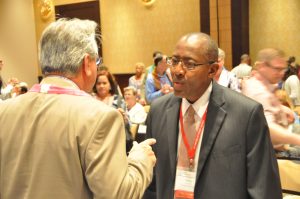 Rev. Tracy Bass
Rev. Tracy Bass
By the Rev. Tracy Bass
Dr. Martin Luther King Jr., in his letter from the Birmingham jail, wrote, “We will all have to repent, not merely for the hateful words and actions of bad people, but for the appalling silence of the good people. The church has remained silent behind the anesthetizing security of stained-glass windows.”
As he admired the beautiful churches of the South and their lofty steeples pointing towards heaven, he asked himself: “What kind of people worship here? Who is their God? Where are their voices?”
The killing of young Black men is so very prevalent in our society. They continue to receive disparate treatment in our judicial system comprising approximately 40 percent of inmates while African Americans make up less than 14 percent of the U.S. population.
Unemployment remains high for black men who are caught in a system which ostracizes, dehumanizes, and stigmatizes them, resulting in feelings of hopelessness. Those feelings often lead to patterns of recidivism, outrage, reckless and irrational behavior, and self-destruction—symptoms spawned by the diseases of racism and discrimination which are so intricately woven into the fabric of our society. It seems, just as in the past, all we see are symptoms, but no one wants to wrestle with the underlying causes. Where are the voices?
This past week there was a clarion call, a resounding cry, by members representing BMCR (Black Methodists for Church Renewal), BUMP (Black United Methodist Preachers), the BLF (Black Leadership Forum), and the Multi-Ethnic Center for Ministry. They called for action to address racism, white privilege and white supremacy in church and society at the 2016 NEJ Conference.
The call to action was approved, and in a show of unity the annual conference delegations were polled, each rising in turn to affirm its commitment for the work set before us. I must admit it was inspiring to see such solidarity if only for a moment. I believe God smiled down at us during this demonstration of oneness. All voices were in sync for the common good.
 But as each delegation returned to its seats following the roll call I could not help but wonder to myself: “Are we really going to do this?” As each person was seated my appreciation for the difficulty of the work grew. After all, throughout the week I’d heard the correlating chant to the Black Lives Matter movement: “All Lives Matter.”
But as each delegation returned to its seats following the roll call I could not help but wonder to myself: “Are we really going to do this?” As each person was seated my appreciation for the difficulty of the work grew. After all, throughout the week I’d heard the correlating chant to the Black Lives Matter movement: “All Lives Matter.”
When I hear this I think of a group attempting to protect an endangered species from being poached, abused and even killed. As protectors lead the charge to save the endangered species, someone yells out: “All species matter!” That cry diminishes the significance of the work being done to ensure the survival of the endangered species.
Yes, all lives matter, but the lives being taken at an alarming rate are those of African American men! While others are sent safely home, too many African American men are sent to the morgue or to prison. Black Lives Matter!
I’ve cried so many tears, and now I find myself wondering: Are we really going to do this?
Many were encouraged by the events which preceded our moment of solidarity, as history was made in our Northeastern Jurisdiction with the election of two African American female bishops.
But someone who spoke from the mic described them as “queer friendly.” On the surface this historic event of electing two African American women is indeed encouraging. But a closer examination caused some to question in their minds whether we were really at a place of unanimity about moving forward on the issue of race.
Or was the election for some about advancing an agenda having little if anything to do with addressing race relations? Did much of the support for these new bishops come from those with no record or history of dismantling racism, or speaking out against white privilege and white supremacy, or giving up power? Could this have been about something else?
Are we really going to do this? We will if the true voices, the voices of those who desire to witness the beloved community, do not dissipate. We will if we come out from behind our stained-glass windows to engage the African American community and engage police in ongoing dialogue. We will if we demand changes—for example, police training that invites community members into the process, so officers can learn from their perspectives.
We will do this if we, as a Church, march on the State House demanding new guidelines on the use of deadly force. We will do this if our only agenda is to be conformed to the image of Christ, to model the love of Christ.
Today, let us hear above all voices the voice of God: “He has told you, O mortal, what is good; and what does the Lord require of you but to do justice, and to love kindness, and to walk humbly with your God? (Micah 6:8)
The Rev. Tracy Bass is Superintendent of the Eastern PA Conference’s East District and a delegate to the 2016 Northeastern Jurisdictional Conference
